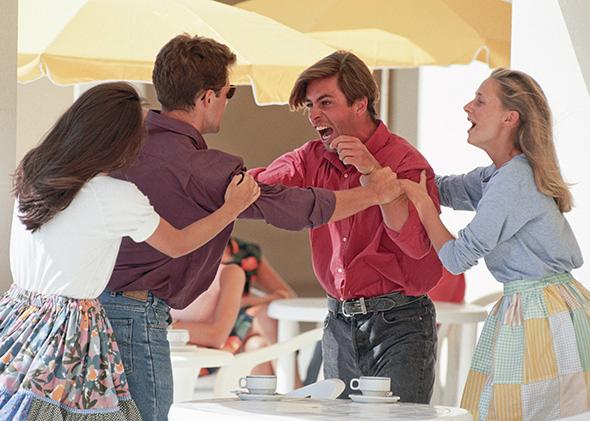There doesn’t appear to be much doubt that Robin Williams conveyed his estate plans to his family in the years before his tragic suicide last summer. His full estate was left to a trust, which his three adult children will inherit. There was a prenuptial agreement between Williams and his wife, Susan Schneider Williams, whom he married in 2011. And as part of his trust, another trust was established to support his wife in the event of his death.
Williams also appears to have done his best to divvy up his personal possessions without resorting to listing each and every one. All clothing, jewelry, and photos he owned prior to his 2011 marriage to Schneider Williams? They go to the children. His awards and other career “memorabilia”? The kids get them. His possessions at a home he owned in Napa? The three children again. The Marin County home Robin Williams shared with his wife? Schneider Williams. The possessions in that residence? Well, excluding all of the above, those are hers.
So where does that leave the tuxedo Williams wore at the couple’s wedding? Or his many collections of things like graphic novels, walking sticks, Japanese anime, and movie posters?
In court, that’s where. According to the New York Times, it took barely four months from the time of the comedian’s tragic August suicide before an acrimonious dispute between Williams’ three children and his third wife descended to legal filings.
There is a trope among personal finance reporters that a good talk with the family is the best way to avoid post-death struggles over your estate when you are gone. Sit down with your loved ones over the holidays. Let your children know your estate plans after you’re done carving the turkey, or opening presents underneath the Christmas tree. Tell them about your will, and how you’d like to see your belongings divided up. Convey some life values while you’re at it. Ask for their input. “The kids may surprise you with their own good ideas about how to sharing (sic) your estate,” CNBC once helpfully advised.
Then there’s reality. There’s barely a person over the age of 40 or so who does not come with a family squabble about, well, things following the death of a well-loved parent, grandparent, or family friend. At the high end, one hears about vacation homes that have been in the family for generations. But most disputes concern less valuable stuff. There are tales told of deeply loved relatives never spoken to again after battles over items like needlepoints and toolkits, living-room tchotchkes or costume jewelry. The battles are often over items that aren’t financially worth an hour of the most inexpensive lawyer’s time.
This is certainly not the case when it comes to Robin Williams’ possessions. True, the lawyers for Schneider Williams referred to the items the late comedian collected as “knickknacks.” In their counterfiling, Zak, Zelda, and Cody Williams claimed these possessions were all but curated, “carefully amassed.” Robin Williams often “shared” his love of his passions with his children, they added. They claim their stepmother, whom they would like to remind us, was only Williams’ wife for “less than three years,” had the possessions quickly appraised, and was motivated by “greed.”
There is a booming business in celebrity memorabilia, which pretty much includes anything a famed person had in his or her possession at one time or another. In December, Julien’s Auctions in Beverly Hills—the self-described “Auction House to the Stars”—sold an Armani Collezioni shirt Williams wore in the 2006 film RV for $128. True, the auctioneers hoped to receive between $800 and $1,200, but that’s certainly $128 more than a similar outfit belonging to you or me would have fetched.
The stuff celebrities prized, as opposed to simply once owned, is worth much, much more. Two golf clubs claimed to be “favorites” of Bob Hope sold at his family’s estate auction for $11,875 and $8,750 in 2008. This is true for the less well-known if still somewhat famous. Socialite Bunny Mellon’s possessions raised $218 million in an auction last fall, more than double presale estimates. Sure, there were amazing gets like a Mark Rothko painting, but it’s likely her now out-of-fashion antique mahogany furniture would have sold for a lot less without her name attached.
Why do we want these things? In items reside memories, reminders of someone we loved or admired whom we will never see again. For public figures, there is a market for that, one that comes with a cash value attached. But even when the item is worth all but nothing, possessions can become proxies for personal battles that can never be resolved. Whom Mom or Dad loved more comes down to who manages to wrest control of a half-complete set of kitchen china manufactured in occupied Japan, or the mildewed woodworking bench from the garage. Second and third marriages—like in the Williams family—make things more complicated, but are far from the only cause of such disputes. But these sorts of battles roil happy families, too.
There’s likely no way to stop a clan from fighting even if only one member has an issue. For Robin Williams’ family, it seems love and money are now so mixed up, they are all but impossible to separate. Misunderstandings multiply in this sort of environment. As a result, the dispute over his estate is likely going to get a heck of a lot nastier before it’s all over.
